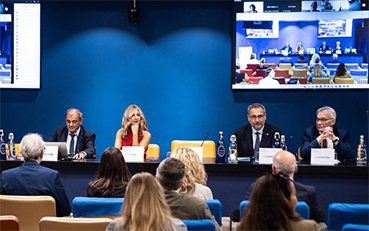Juan Antonio Pedreño was re-elected for the fourth time as president of Social Economy Europe (SEE), an organization that encompasses 2.8 million entities, represents about 8% of the European GDP, and employs more than 13.6 million people. In Pedreño’s words, “a stage full of challenges begins at a time when the Social Economy enjoys great recognition at the state and international levels.” The Second Vice President and Minister of Labor and Social Economy of the Spanish Government, Yolanda Díaz, closed the Assembly, defending this productive model as a driver of sustainable, democratic, and socially fairer economic development.
At the XVI General Assembly of ‘Social Economy Europe‘ (SEE), held on June 24 in Rome, Juan Antonio Pedreño was unanimously re-elected for the fourth time as president of this organization, which encompasses 2.8 million entities, represents 8% of the European GDP, and employs more than 13.6 million people, according to SEE data.
Over the next three years, the president of the Spanish Business Confederation of the Social Economy (CEPES) will work with the new Executive Committee, also elected during this event.
Juan Antonio Pedreño thanked the representatives of the European Social Economy for the commitment of the Spanish Government and, in particular, the Second Vice President and Minister of Labor and Social Economy, Yolanda Díaz, to this business model “which represents the same as the automotive sector in Europe.” For Pedreño, “a stage full of challenges begins at a time when the Social Economy enjoys great recognition at the state and international levels.”
According to Pedreño, this business model addresses three major challenges of European society: “It strengthens democracies, facilitates the green transition and the fight against climate change, and also reduces inequalities.”
At the closing of this assembly, Yolanda Díaz defended this productive model as a “driver of sustainable, democratic, and socially fairer economic development” and committed to continuing to promote the Social Economy, bringing it to every corner of the world.
The economy of the future is the social economy
For Díaz, “the economy of the future is the Social Economy” and she will work mainly on three axes to place it at the center of European legislative activity: “We will work to promote the designation of a European Commissioner responsible for the Social Economy for the next European legislature, an initiative already supported by several Member States and included in the Liège Roadmap.”
The second axis on which the Second Vice President will work is the renewal of the Social Economy Intergroup in the European Parliament, a body that has the support of more than a hundred MEPs.
Finally, Díaz assured that she will promote the development of the first European recommendation on the Social Economy, which was approved during the Spanish presidency of the EU Council, through increased economic allocation and a timeline for the European Social Economy Action Plan.
Towards an Italian Action Plan for the Social Economy
After the SEE assembly, the launch event for the Italian Action Plan for the Social Economy also took place in Rome, promoted by Confcooperative, Legacoop Nazionale, and the Associazione Generale delle Cooperative Italiane, with the support of the European Confederation of Industrial and Service Cooperatives (CECOP) and Social Economy Europe.
With this event, the Italian cooperative and social economy movement calls on the Italian Government to implement the recent recommendation of the Council of the European Union to develop favorable framework conditions for the social economy.
For the Italian social economy actors, “it is imperative that Italy promptly follow up on this recommendation. It is necessary to develop a clear and determined strategy, which includes legislative interventions to define and regulate the social economy, as well as specific national and regional policies and programs. Labor and fiscal policies that favor this vital sector are also fundamental; the programming of European and national funds must be reviewed, and specific public-private partnership modalities need to be created.”







